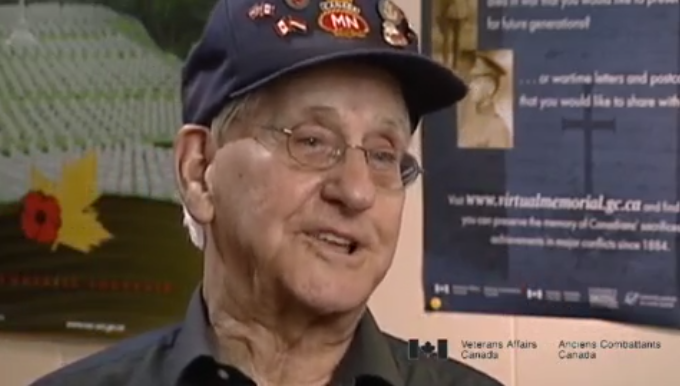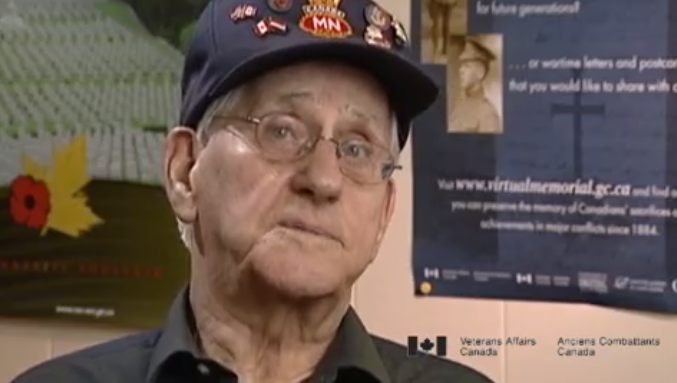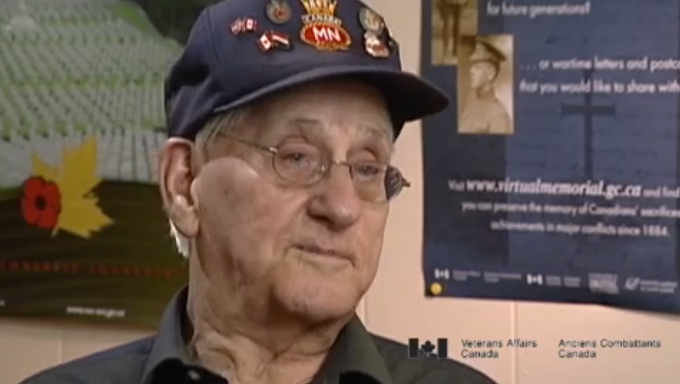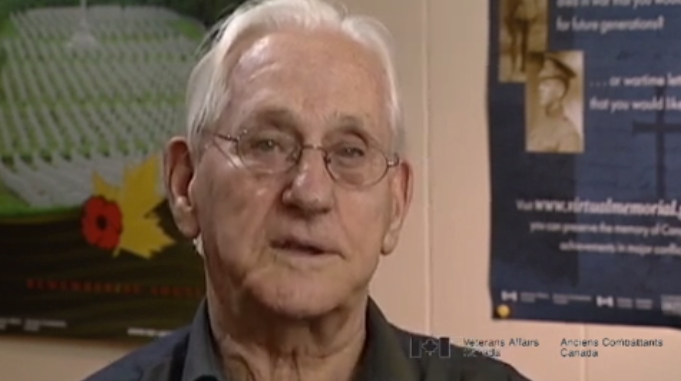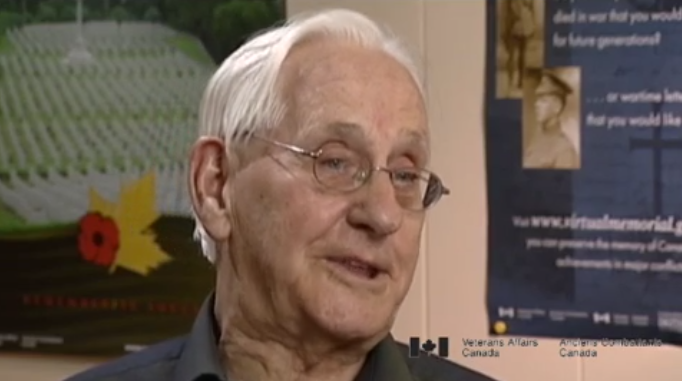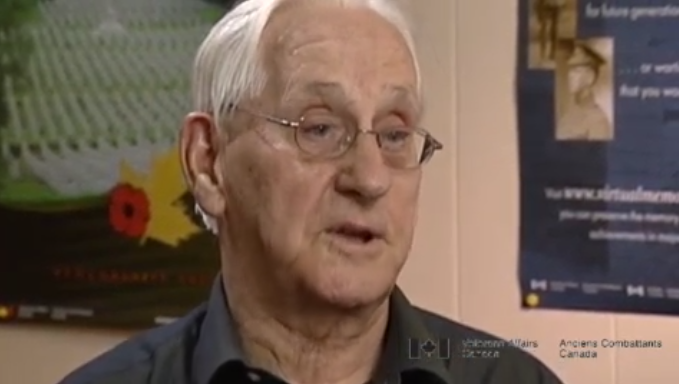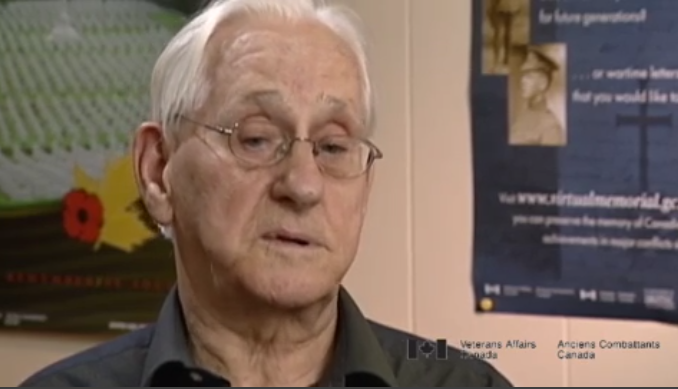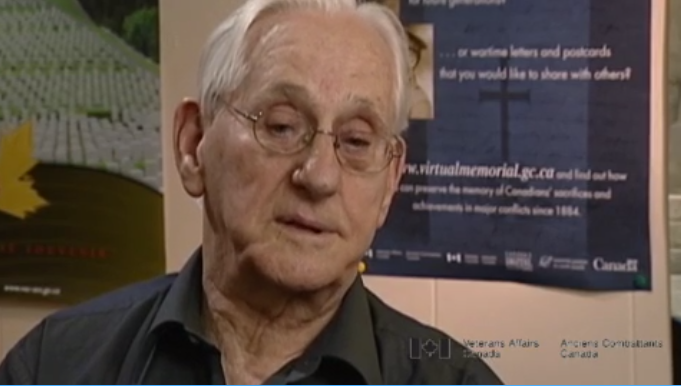It was the 8th of May when we got the word that the war was over.
Heroes Remember
It was the 8th of May when we got the word that the war was over.
This video format is not currently supported!
Transcript
On the 4th of April, 1945, we arrived in Halifax. And I think
it was the 8th of May when we got the word that the war was
over. Anyway, I went up and I … my brother came on board the
ship. And they said, he asked the guys back aft, you know,
“George Evans here?” And they said “Yes, he’s washing dishes.”
You get a mug, a tin mug and a plate, and a fork, knife or
spoon, and you had to clean it yourself and put it in your own
locker, you know. And you just had the mess table there, and
you had the bunks. There were 12 of us in the one big room with
the double bunks. So anyway, he says, “Yes, right here.” I
said, “Oh my God, I know that voice.” It was my brother.
Interviewer: Quite a feeling ...
He said, “Come on, get your gear. We’re going home.” I said, “I
can’t. I’ll be a deserter.” I said “I can’t leave, I signed
articles, you know, articles of agreement.” I said, “If I
leave, I’ll never get in another ship and I’ll be fined, lose
everything.” He said, “To hell with that. Come on!” you know.
So the fellas said, “Go ahead, we’ll cover for you.” I asked
the captain if he could pay me off and he said, “If I could get
somebody to take your place,” he says, “I would.” But he
couldn’t get nobody to take my place. Not to go below. No
trouble getting the people on deck, but not below.
Interviewer: Why was that?
It was too dangerous. You have like a snowball in
hell of getting out alive. The torpedoes struck mid-ship, you
know, in the stoke-hold or the engine room. It would be just
flooded out. You wouldn’t have time to get up over those steps.
Interviewer: But that’s where you were.
Yeah. Not like you got an elevator to shoot right up.
You had to take your chances.
So anyway, I said, “Alright, I’ll pack my suitcase and
my sea bag,” and away I goes. Up by the gate an officer says,
“Where are you going?” and I said, “Going on leave.”
Interviewer: You were lying again.
Yeah. I said, “That’s my brother.” So anyway,
I went up and then things got bad in Halifax, you know,
and Immigration was looking for me, and the police, and the
shore patrol, the naval shore patrol. And, of course, they had
on the … I went … what happened then was, I went into the
merchant navy club on Hollis Street, I think it was, and I went
upstairs, you know. Someone told me immigration was asking for
me and I ran upstairs and I talked to this coloured woman then.
She said, “Get in under the bed.” I got under one of the beds
there, you know. So she went around and found out they were
gone so then I come out, I told her I was hungry. She said,
“You got any money?” and I said, “No, I’ve got no money.”
She gave me two dollars to get a drink and a lunch.
Interviewer: So at this point were they
considering you a deserter?
Oh yes, yeah ...
Description
Mr. Evans describes how, at the end of the war, he left the ship in Halifax with his brother before he was discharged. He hid when police and immigration were looking for him as they considered him a deserter.
George Harold Evans
George Harold Evans was born March 17, 1926 in St. John’s, Newfoundland. He was one of thirteen children. His father, a First World War Veteran, worked in the Newfoundland fishery and Mr. Evans fished with his father.
Meta Data
- Medium:
- Video
- Owner:
- Veterans Affairs Canada
- Duration:
- 3:29
- Person Interviewed:
- George Harold Evans
- War, Conflict or Mission:
- Second World War
- Branch:
- Merchant Navy
- Occupation:
- Messboy, Fireman/Stoker
Related Videos
- Date modified:



